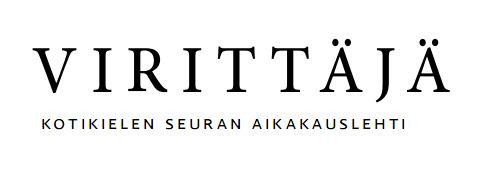Kielellisen variaation ja sosiaalisen muutoksen suhteesta. Artjärven murteen omistusmuotojärjestelmä
Avainsanat:
hämäläismurteet, Lindén, Eeva, murteen muuttuminen, murteentutkimus, omistusmuodot, sosiolingvistiikka, variaatio, yleinen kielitiede
Abstrakti
On the relation between language variation and social change. The possessive morpheme system in the Artjärvi dialect in the 20th century (englanti)1996 (100)
Pirkko Nuolijrvi (pirkko.nuolijarvi@kotus.fi)
On the relation between language variation and social change The possessive morpheme system in the Artjrvi dialect in the 20th century
The article discusses the way in which language variation manifests social change in a language community. The discussion is illustrated by an examination of how a restricted morphological system of possession-marking in a particular dialect has changed during the 20th century, and become more like the standard spoken language. The focus is on the possessive forms in the Artjrvi dialect, one of the Iitti group of Southeast Hme dialects; data are examined from the turn of the century, the 1920s and '30s, the 1970s and the 1990s.
At the beginning of the century, the 1st p. sing. possessive form in the Iitti dialects had suffix variants with -m (poikam 'my son'), and the 2nd p. sing. had variants with -ns (pojans kans 'with your son'). The weak grade was usual in cases other than the nominative singular. The material from the 1920s and 1930s shows a great deal of variation. During the 1970s, only the older Artjrvi informants used the most marked variants; the younger generation used 1st p. variants with -in (poikain), and 2nd p. variants with -s (poikas kans). The strong grade was used almost without exception. In the 1990s, the older generation still showed signs of the old system, while the young people and children had adopted the standard spoken-language type mun poika.
The development can be divided into four stages: a marked Iitti stage, a Southeast Hme / Southern Finnish stage, a Southern Finnish / standard written Finnish stage, and a standard written / standard spoken stage. Social changes, together with changes in the social bonds of members of the language community, have disrupted the previous dialectal system. The standard written and spoken variants have gradually displaced the dialectal variants, which finally disappeared in the 1980s.
Viittaaminen
Nuolijärvi, P. (1996). Kielellisen variaation ja sosiaalisen muutoksen suhteesta. Artjärven murteen omistusmuotojärjestelmä. Virittäjä, 100(1), 2. Noudettu osoitteesta https://journal.fi/virittaja/article/view/38841





